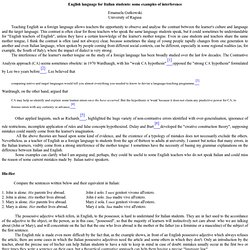

Teaching English to Italians. The Difficulties of Learning the Italian Language. A look at how complicated and different Italian is for English speakers, and just what learning the language involves.

A Few Basics This is not an Italian lesson, just a few interesting and convoluted facts about learning the language. In Italian, like other European languages, all objects have a gender, they are either masculine or feminine, and consequently all articles and adjectives used with these objects take on the same sex as the noun. The same applies for plurals – adjectives also become plural, so do articles, and this is hard for an English speaking person to learn.Adjectives usually follow the object, so a tall man becomes - a man, (who is) tall.1 in Italian is uno, but when used before a word beginning with any letter, except “z or s + consonant” it becomes “un”.In many cases the masculine word ends in “o” while the feminine word ends in “a” and the plural of “o” is “i” with the plural of “a” is “e”.
Top 10 Myths About Learning Italian. English language for Italian Students: some examples of interference. English language for Italian students: some examples of interference Teaching English as a foreign language allows teachers the opportunity to observe and analyse the contrast between the learner's culture and language and the target language.

This contrast is often clear for those teachers who speak the same language students speak, but it could sometimes be understandable for "English teachers of English", unless they have a certain knowledge of the learner's mother tongue. Even in case students and teachers share the same mother tongue, I think the contrast is often (and not always) clear, because sometimes the slang of young people rapidly changes from one generation to another and even Italian language, when spoken by people coming from different social contexts, can be different, especially in some regional realities (as, for example, the South of Italy), where the impact of dialect is very strong. Wardraugh, on the other hand, argued that His-Her.